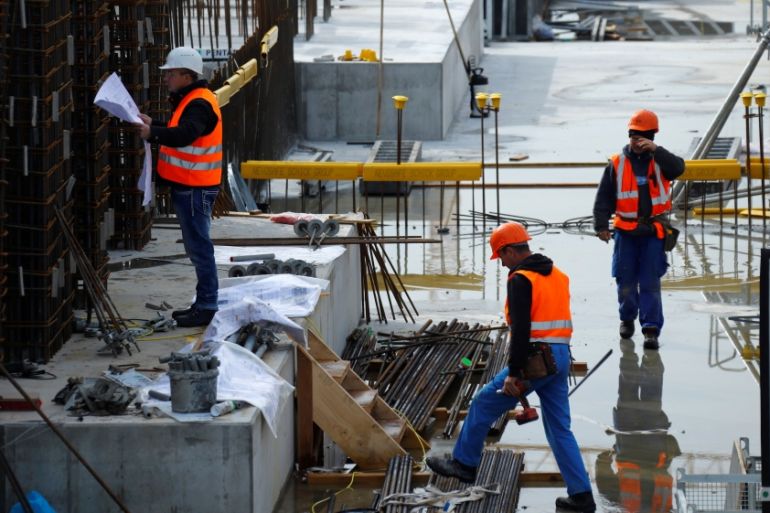German economy rebounds but is not out of the woods
The German economy bounced back in the first quarter. But global economic headwinds are still a risk.

Berlin, Germany – Fears of an economic slowdown in Germany have proven to be exaggerated as the country saw a return to growth in the first quarter of the year, showing surprising resilience despite the current global trade tensions.
The Federal Statistics Office on Wednesday announced that the economy had grown by 0.4 percent since the previous quarter and by 0.7 percent compared with the same quarter last year, boosted by higher household spending and a construction boom.
Keep reading
list of 4 itemsWhy are nations racing to buy weapons?
Parallel economy: How Russia is defying the West’s boycott
US House approves aid package worth billions for Ukraine, Israel
The announcement followed on the heels of unexpectedly strong growth in exports in March, up 1.5 percent since the previous month and 1.9 percent from the same month a year earlier.
This is welcome news after Europe’s largest economy narrowly avoided a recession late last year.
Berlin has already adjusted its growth expectations downwards for 2019 overall to just 0.5 percent. Last week Finance Minister Olaf Scholz said the government had significantly slashed its forecast for federal tax income over the next four years.
However, that may have been premature, as analysts say the poor performance in the latter half of last year was due to one-off factors, such as the car industry’s problems with implementing new emissions standards and low water levels, particularly in the Rhine River, holding back the movement of some goods.
A strong jobs market, low unemployment and higher wages have helped put the German economy on more solid footing, according to the Macroeconomic Policy Institute (IMK), which has ties to the labour unions. The institute sees less than a 30 percent chance of a recession in the next quarter.
“Unlike previous recovery phases, this upswing is driven to a considerable extent by domestic demand,” IMK director Sebastian Dullien said in a statement released Wednesday.
“Germany is clearly more than just an export-orientated economy, because we see that growth is strong enough to only come from domestic drivers, that is a clearly a positive message,” Carsten Brzeski, chief economist at ING Germany, told Al Jazeera.
No Cause for Complacency
However, the latest positive news doesn’t negate the need to increase both public and private investment in the economy, Brzeski argues, noting “It would be completely naive to return to complacency.”
Furthermore, in the coming months, Germany will likely have to navigate increasingly choppy waters. Potential global headwinds include the intensifying trade war between the US and China; the effects of Brexit, particularly if disorderly; and threatened US tariffs on Germany’s auto industry, which employs 800,000 people. The auto industry is already struggling due to environmental regulations and competition in the e-car market.
Mounting global uncertainty is continuing to dent confidence, with German business sentiment slipping in April, according to the Ifo Institute for Economic Research.
And a survey of financial professionals released on Tuesday by the ZEW-Leibniz Centre for European Economic Research- showed that there was lingering pessimism about the German economy’s prospects over the next six months due to the looming global trade dispute.
“The risk is that the external risks will actually get bigger and get closer to the German economy, so that we will reach a point at which strong domestic demand is not able to entirely offset the risks in the external environment,” Brzeski said.
Yet, according to Stefan Klooths of the Kiel Institute for the World Economy (IFW), this may bring opportunities as well as risks for Germany and Europe.
For example, some firms could opt to relocate manufacturing to the European Union. “Of course, we are concerned that the international trade order is under so much pressure and the resulting uncertainty is of course a poison for economic development and dynamism, but it is not so certain that we will be the clear losers,” he told Al Jazeera.
At the same time, if there is a global slowdown, Germany has so far blocked the fundamental reforms to the eurozone demanded by French President Emmanuel Macron, points out Carsten Nickel of the risk-advisory group Teneo.
“That to me is a concern,” said Nickel. “If we are coming to an end of the cycle that we’ve been through over the last 10 years or so, that institutionally the eurozone is not as well prepared as it could be for the next downturn.”